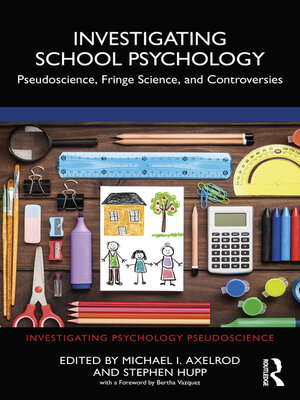Investigating School Psychology
ebook ∣ Pseudoscience, Fringe Science, and Controversies · Investigating Psychology Pseudoscience
By Michael I. Axelrod

Sign up to save your library
With an OverDrive account, you can save your favorite libraries for at-a-glance information about availability. Find out more about OverDrive accounts.
Find this title in Libby, the library reading app by OverDrive.



Search for a digital library with this title
Title found at these libraries:
| Library Name | Distance |
|---|---|
| Loading... |
Investigating School Psychology provides a fascinating exploration of the field of school psychology through the lens of pseudoscience and fringe science. Contributions from leaders in the fields of school psychology, clinical psychology, and education honor the role of science in the field while also exploring and guarding against the harms that pseudoscience can cause.
School psychology and, more broadly, the field of education are particularly susceptible to pseudoscience, fads, and maintaining the status quo by resisting the adoption of new ideas. Using an exhaustive review of the current literature, this book discusses various concepts in school psychology that have been largely discredited and many practices that continue to exist with little to no scientific support. Each chapter helps differentiate between dubious and evidence-based approaches while providing a useful resource for practicing school psychologists and educators to distinguish between science and pseudoscience in their everyday work with children. The book's discussion of the harmful nature of pseudoscience in school psychology is inclusive of all students, such as students with disabilities, those diagnosed with neurodevelopmental disorders, those with academic problems, and all other children in schools.
Investigating School Psychology is valuable supplemental reading in undergraduate and graduate courses in education and school psychology and is also a beneficial reference for practicing school psychologists to distinguish between science and pseudoscience in their practice.







